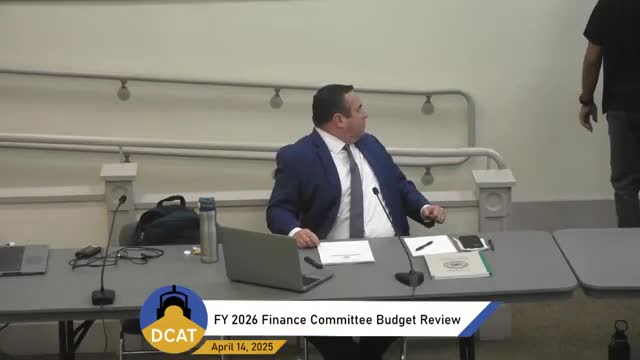Danvers interim manager outlines FY26 budget pressures, one-time revenues and reserves
Get AI-powered insights, summaries, and transcripts
Subscribe
Summary
Interim Town Manager Rodney told the Finance Committee the FY26 budget faces rising health insurance and school assessment costs, while a large certified free cash balance and one-time landfill and investment gains give the town room to reinforce reserves and fund capital.
Interim Town Manager Rodney told the Finance Committee the town’s proposed FY26 budget must absorb rising health care costs, increased school assessments and higher retirement contributions while relying on unusually strong one-time revenues and certified free cash to balance the plan.
Rodney opened the presentation by noting Danvers remains comparatively affordable among nearby benchmark communities, but said persistent budget pressures outpace the town’s new growth and Proposition 2½ capacity. “Our renewal rate was a 10.91%,” Rodney said of the town’s health insurance renewal, adding the increase translated to “a $1,450,000 increase year over year.”
The presentation said Danvers expects roughly $3.0 million in new levy capacity from Proposition 2½ and conservative new-growth estimates, while the primary budget pressures identified for FY26 include: an increase in the town retirement contribution tied to actuarial assumptions, the health-insurance renewal, a 3.8% school request and a roughly 4.09% assessment increase from Essex Technical High School.
Why it matters: The town has certified an unusually large free cash balance — Rodney called it “probably historic at $13,870,000” — and officials are proposing to use portions of that amount to shore up reserves and fund one-time capital. Rodney said removing identified one-time items (notably landfill proceeds and elevated investment income) brings the recurring reserve closer to the Department of Revenue best-practice target of 3–5% of net general fund revenue.
Key details and tradeoffs
- Free cash and one-time revenue: The manager’s slides show $13,870,000 in certified free cash for FY24. Rodney said $3,800,000 of that was unanticipated revenue tied to the landfill project and that investment income exceeded projections by “over $2,500,000” (the presentation also cited a $3,000,000 investment-income figure for FY24). Rodney and staff said they are recommending using portions of free cash for debt stabilization ($5,000,000 recommended contribution), general stabilization ($1,000,000 recommended contribution) and capital needs.
- Recurring cost pressures: Danvers Public Schools asked for a 3.8% increase (the presentation quantified the schools’ request as roughly $1,980,000 year over year). The manager said Essex Tech’s assessment rose about 4.09% and called the insurance renewal the single largest driver in the town budget.
- Retirement funding: Rodney said the town budgets to increase its retirement contribution by roughly 8% annually to meet an assumed funding target and that the assumed investment return for the pension valuation has recently been reduced to 7%.
- Reserves and caution: Rodney warned against overrelying on investment income and other volatile revenue sources. “If you back both of those numbers out, you get roughly a little over $7,000,000 which again would be close to our target of 3% to 5%,” he said, noting the town wants to preserve capacity to handle future downturns.
Select-board goals and staffing
Rodney reviewed three select-board priorities embedded in the FY26 plan: maintain staffing and services while transitioning to a new town manager; ensure public-safety staffing and emergency-services funding (the FY26 proposal includes funding for one additional police officer and absorption of three former SAFER grant-funded firefighters into the levy); and provide resources to Danvers Public Schools, including support for special-education services.
Questions from Finance Committee members focused on the one-year health-insurance renewal cadence, the pension discount-rate assumption and the sustainability of relying on the large free-cash balance. In response to a question about how much of the current free cash came from ongoing versus one-time sources, Rodney reiterated the landfill and investment gains were one-time and said staff was conservative in projecting long-term recurring revenues.
What’s next
Rodney said the Finance Committee will continue department-level hearings and return for a warrant review before Town Meeting, which the presentation listed as May 19. Finance Committee deliberations and warrant decisions will determine how much of the recommended stabilization contributions and one-time capital are presented to voters.
Speakers quoted in this article are Interim Town Manager Rodney and Select Board member Mike Bean, both of whom spoke while the Finance Committee reviewed the townwide budget overview.
